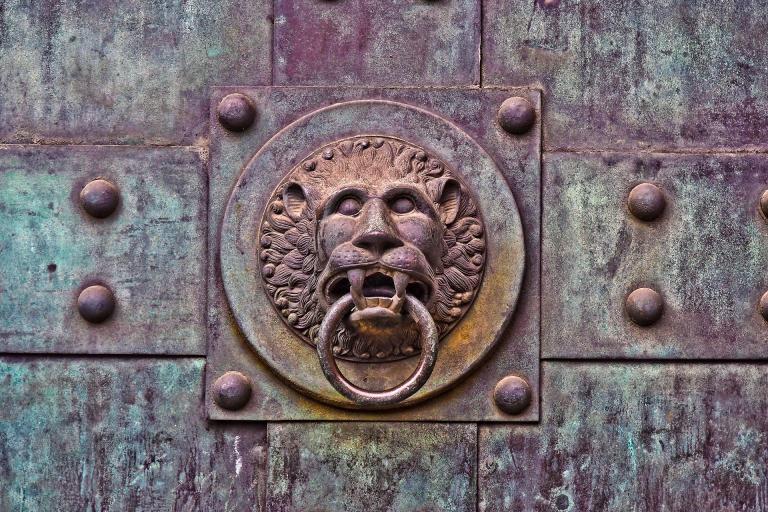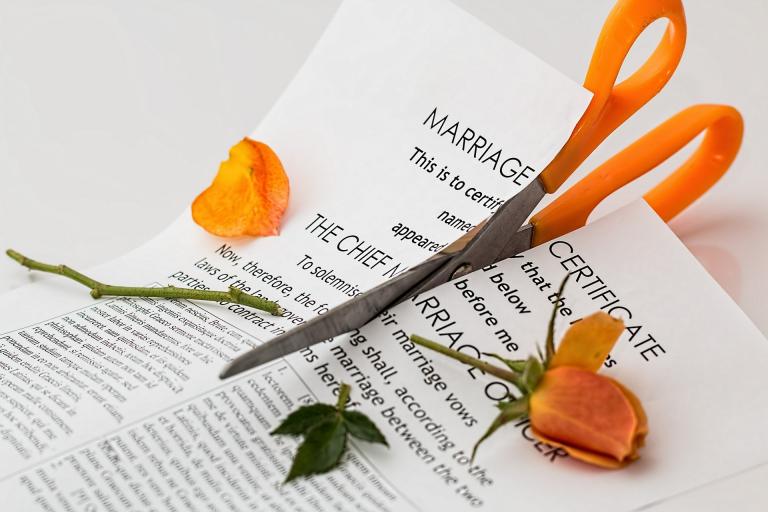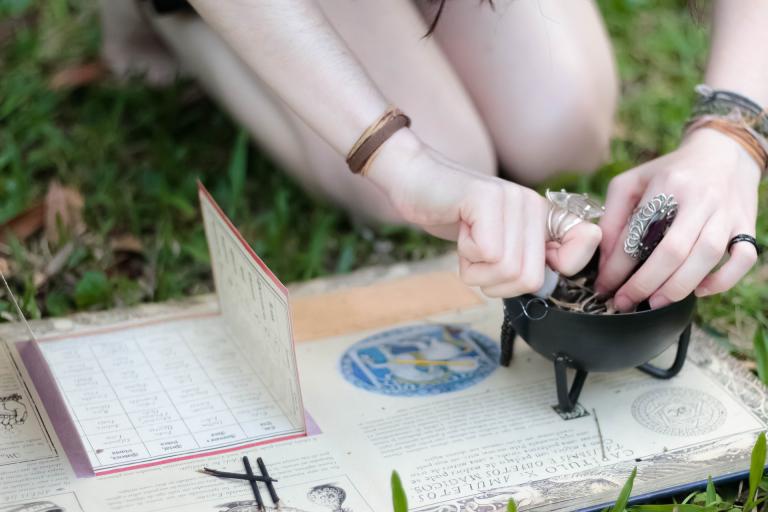The word “Gatekeeping” has become a huge buzzword within the witchcraft community over the last several years. Generally, the term is used to describe any and all attempts to keep someone from doing something or joining a movement/community.
At first blush, excluding people from groups seems like something we should be against. Absolutely! However, what we did not expect is that the anti-gatekeeping movement would actually empower the modern colonization of black and indigenous magic and culture. Even witchcraft itself, regardless of its cultural heritage, should not be made available to just anyone, and thinking that you have a divine right to be a part of any group just because you want to is entitlement and privilege at its finest.

Just this morning, I watched several folks cry “gatekeeping” when it was suggested that they should respect African culture if they are going to practice African traditional religion. Unfortunately, this term has become the battle cry of cultural appropriators and spiritual bypassers.
Claiming “gatekeeping” has turned into an all-access pass for folks to force their way into the religions of black and indigenous communities while simultaneously completely ignoring the rules of the religion they so desperately wanted to be a part of. “I get to practice voodoo because if you say ‘no’ it’s gatekeeping. I also don’t need an initiation, and I don’t have to listen to elders because that’s also gatekeeping.”
Meanwhile everyone who actually belongs to that community and culture has gone through the proper channels, listened to the elders, and respected the traditions. I also see this when folks try to keep indigenous medicine ceremonies open to indigenous people only. Non-indigenous folks claim gatekeeping and act oppressed when they aren’t welcome in these spaces.
This is entitlement. This is colonization. I myself have been told I’m a gatekeeper for saying that non-native people shouldn’t be wearing Native American headdresses to Coachella. I don’t know about you, but it sounds to me like gatekeeping isn’t the real enemy here.

Many “influencer” witches on social media have been peddling the wide-open gate theory that magic is wonderful and beautiful and not only available to everyone, but a fundamental right bestowed upon every single living person at birth. I don’t agree with this in the slightest.
First, we must recognize the fact that most of these influencer witches have something to sell, and the more people they invite to the cauldron, the more money and recognition they gain. Second, we can see clearly from history and past incidences (Christopher Case, and Kat Restin, just to name a few) that witchcraft is not safe, nor is it meant for everyone.
When inviting the masses to participate in witchcraft, influencer witches (whose voices are much louder than most) nearly always focus on the “love and light” and witchcraft’s ability to bring prosperity, health, love, and the manifestation of all your dreams. They seem to forget about the other side of the coin. The side of witchcraft that brings death, sickness, and psychotic breaks. The side that rips apart happy loving marriages, and the side that tortures innocent people for small injustices. This includes the part that leaves people mysteriously dead after invoking spirits they have no business messing with.
Often gatekeeping within the magical community is in place to protect innocent people from getting hurt, and not everyone has the temperament to ethically handle the craft. We learned with the dawn of social media that people feel much more comfortable being nasty to one another when they can hide behind their computer screen. It seems to go double for curses cast in the safety and anonymity of their own home.

You see, I’m a professional witch. This means I offer spell service for people and get to hear what it is that they want done. I’ve gotten messages from teenagers who want me to kill their parents because they told them they can’t go to a dangerous-sounding party (which is a metaphor for everything I’m talking about right now if you think about it).
Folks have wanted me to ruin a co-worker’s career because they simply didn’t like the person or they perceived some sort of slight from them. I’ve gotten messages from women telling me they’ve been secretly feeding their period blood to their boyfriend for months but it doesn’t seem to be working, and they want to know why he’s not completely and psychotically obsessed with them. I’m not joking. The most common messages I get are from folks who want me to cast spells on people to force them to be dangerously obsessed with them.
I’ve even had folks come to me asking me to force people to fall in love with them and explicitly state they want it done against the person’s will and even declare “I know that’s messed up but it’s what will make me happy” (I’m not joking, I have the receipts). Several weeks ago I had a man come to me and ask for a “commitment and obsession” spell cast on a lady friend of his who also just happened to be his wife’s best friend (and yes I have the receipts for that too).
A shocking amount of the time, these spells are aimed at married or happily committed people with families who the person does not even know. A lot of the time the person asking for the work will claim to be desperately in love with them but also admit to never having spoken to them. All the same, they’d like the person forcibly bound to them for the rest of their life. These are clearly people who should not have access to witchcraft. Some folks are not emotionally or mentally equipped to handle something so dangerous. A little gatekeeping seems necessary here.

On the other hand, I’ve gotten messages from the victims of this work. Women who had happy loving marriages for decades until one day a rival of theirs picks up a book on witchcraft or hires the local Bruja. The next morning their husband wakes up and announces that he’s no longer in love with them, and by the end of the week he’s moved in with the other woman and keeps saying strange things like “I don’t know if I love her, I just have to be around her”. Their children are devastated and confused and don’t know why their father won’t see them anymore. I’ve come across this story multiple times from people all over the country, each with evidence to back up their claims. Clearly, if someone had stopped this rival from entering the world of witchcraft the family would still be together, and those children would be brought up in a loving, unbroken home.
The kicker is that witchcraft has never actually been an open community. Witchcraft has a long and proud history of necessary gatekeeping because our ancestors knew the risks associated with this work. Hence why we talk about “the secrets hidden in the night” not the “free initiations in the pop-up shop starting at 3pm, bring a flower crown!”
In the old days you had to put in work to find any path to witchcraft, and that was a large part of the overall journey of the witch. You actually had to put in work. Even today certain sects of witchcraft are closed to the public and several even require you to pass a test or divination in order to prove you are worthy of initiation into their path.
This has become a major point of contention between traditional magical religions and modern witches who think they should be allowed to go wherever they please. However, does someone’s entitlement, ignorance, and inability to swallow the word “no” override centuries of tradition (particularly among traditions that belong to minorities and POC)? The answer, yet again, is no.
Even if you believe that witchcraft is a fundamental right somehow bestowed upon every living being, you have to take into consideration how we handle other fundamental rights with dangerous consequences.

Take driving a car for instance, it’s a fundamental right afforded to all people. However, certain rules and regulations are in place to protect the public. You must be of a certain age (gatekeeping), you must pass a test (more gatekeeping), you must abide by certain rules (still, more gatekeeping). If you show that you are unable to safely use your vehicle either by physical or mental handicap, or you simply can’t be responsible with it, your right to drive is revoked for the safety of the public. Even though driving is your right, the safety of the public comes first.
As we can see, people are careening their metaphorical magical cars up onto the sidewalks, destroying lives, all while shouting “I do what I want, you don’t own magic!” And flashing their “Magick has no rules, do what feels right” bumper sticker. Clearly, some gatekeeping may be helpful here.
In conclusion, magic is not safe. Magic is not all love and light. Magic is not consequence free. Magic that belongs to people of color is not up for grabs by just anyone. There are traditions, rules, and guidelines to follow. Thinking those gates are unfair is toxic entitlement. These things are hard truths for a lot of modern witches to swallow, but they need to be swallowed. We need to stop pretending that magic is a harmless hobby.
There are very real dangers associated with this work and impetuous, ignorant, and unstable people who would cause chaos and destruction need to be told “no” (or at least, “not yet”). While I do believe the gates of witchcraft should remain open, we should not be bullied into allowing folks to wreak havoc in our community because we are afraid to be called a “gatekeeper”. We have a right to call people out on their misbehavior and refuse to teach when necessary. If that’s “gatekeeping” then so be it. A little security when it comes to who is welcomed into the witchcraft community isn’t only prudent, it’s necessary.
So next time you tell someone that they should respect African culture while practicing African religion, or you tell someone you won’t let them into your coven because you know they’ve hexed seven innocent people that week, and they tell you you’re a gatekeeper, know that you’ve done what’s right.


















